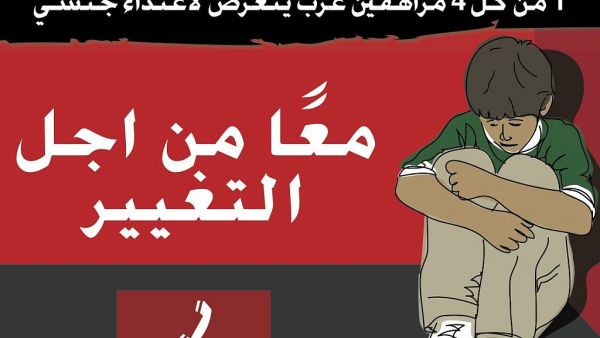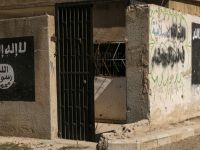In November 2016, researchers at Haifa University published a startling finding: Arab boys in Israel were much more likely to be sexually abused than either their female counterparts, or Jewish boys and girls.
Nearly 30% of Arab boys in Israel surveyed said they’d been victims of sexual assault. That’s in comparison to 17-18% of Arab girls, or Jewish boys and girls, who reported being sexually assaulted.
Chen Avidar, 32, a Jewish Ph.D. student at Tel Aviv University studying to become a therapist, took notice of this phenomenon and two months ago opened the first-ever sexual assault hotline for Arab men in Arabic.
The new hotline, which is part of the Tel Aviv Sexual Assault Crisis Center, is meant to serve both Arab Israelis and Palestinians.
Eran Han, the manager of the center, said the decision to provide services to Palestinians was made “the moment we decided to be accessible to Arab men” in Israel. Advertisements for the hotline have a specific number for Palestinians to use, because the regular number for the hotline is only usable in Israel.
Palestinian women already have sexual abuse hotlines in Jerusalem and Ramallah. There also two 24/7 hotlines for female Arab victims of sexual assault in Israel in Arabic and nine different hotlines for women in Hebrew.
Han added that in the past the center had given aid to Arab men, but only in Hebrew.
Avidar said that there is a dearth of literature, academic or otherwise, on sexual abuse against male Arabs.
“That’s why I’m writing my Ph.D. thesis on the topic,” he said, adding he was sure there is no hotline for male sexual abuse victims anywhere else in the Arab world.
Having studied the Arabic language for his undergraduate degree, and psychology in his later studies, Avidar said that starting the hotline was a way to “combine my two interests.”
The hotline for Arab men, which gives services in Arabic as well as Hebrew, is currently only open on Tuesday nights from 8 p.m. to 11 p.m.
The reason for such limited hours, said Avidar, is because, despite intensive searches for male Arabic-speaking volunteers to work the phones for the hotline — including advertising at every academic institution in the Tel Aviv region — only one man stepped forward to help.
Avidar has managed to recruit a second volunteer for the hotline, but he is still in the middle of his six-month training course. When the new recruit finishes his training, the hotline will double its hours on Tuesdays.
The hotline itself receives no funding, and both Avidar and his one helper work pro bono.
Avidar said that since men are generally considered the breadwinners for their families, they work more and have less time to volunteer.
He also surmised that part of his recruiting woes was due to the fact that sex is more taboo in the Arab community.
He has used social media to try to spread awareness about the new hotline.
Aside from psychological aid, the hotline offers a number of services to its clients. These include accompanying victims to file a complaint with the police, and if the case goes to court, the hotline volunteers will also accompany their client through the judicial process.
The hotline will also help victims find more permanent therapy.
It also offers services to secondary victims, meaning close relatives or friends of victims affected by the assault. These secondary victims can also get advice from the hotline on how to help the abused.
Nadia Massarweh, an educational psychologist and national coordinator for the Arab community in the Unit for the Prevention of Child Abuse in the Ministry of Education, told Israel Radio on Wednesday that the new hotline “is important because in Arab society we are not aware of the abuse happening to our boys.
“We are like most people who have thought — and still think — that abuse is something that happens generally with women… We have some sort of blind spot for our boys,” she said.
The Haifa University study that discovered the high rate of sexual abuse suffered by Arab boys said it was the largest survey of its kind ever.
The study was based on data collected from 12,035 Jewish and Arab students, in 6th, 8th and 10th grade.
The study found that Arab children reported higher maltreatment than their Jewish counterparts in all categories tested for — including physical, sexual, verbal and emotional abuse.
The study also found that Arab boys reported higher levels of abuse than Arab girls in all categories tested for, except for exposure to domestic violence.
Explanations for the higher rate of abuse among Arabs in general, the report said, include different “culture-specific parenting styles practiced in minority cultures,” as well as the fact that the Arab community in Israel, compared with the Jewish majority, is characterized by higher rates of poverty and unemployment. Another explanation given is that Arab Israelis generally live in rural areas, where they have less access to social and welfare services.
- Child Porn and Rape Among the Top Trending Porn Terms in Middle East
- Turkish Police Filmed Beating Women Who Reported Sexual Assault
As to why Arab boys are particularly vulnerable to sexual abuse, the study does not provide any explanations, but Avidar said during his research he has managed to come up with a few.
Arab boys are far less supervised than Arab girls, he said, and this leaves them “more exposed to perpetrators outside of the family context.”
He added that potential victimizers understand there are higher consequences for abusing girls, including possible pregnancy and the initiation of a blood feud between families. There is also the fact that when girls are sexually abused, it leaves the evidence of a broken hymen.
Girls are also more afraid of being blamed for their victimhood, he said, so it’s likely they report sexual abuse less.








